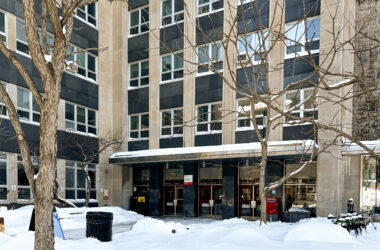The Law Students’ Association Council recently voted to establish a committee that will evaluate its relationship with the Students’ Society, opening the door to the possibility that the LSA will disaffiliate from SSMU.
The motion, put forward by LSA President Alexandre Shee, requires the new five-person committee make suggestions as to how its relationship with SSMU can be improved.
Like other undergraduates, law students are currently represented by both their faculty association, the LSA, and by their representative on SSMU Council. As such, they pay fees to support their membership in SSMU.
Unlike other undergraduates, however, law students also pay fees to the Post-Graduate Students’ Society. According to Shee, the fact that law students pay two separate fees was a major reason for his decision to push for the committee.
“The decision is about who we’re paying these fees to,” Shee said. “Where is the centre of our social life? It’s not Gert’s, it’s Thompson House.”
In an interview with the Tribune, Shee levelled broader criticisms at SSMU as well. He described the organization as largely irrelevant to most law students and complained that the SSMU executives rarely visited the Faculty of Law.
“What we have right now is a SSMU that is disconnected and too centralized,” he said.
Shee also urged other faculty associations, such as the Arts Undergraduate Society, to re-examine their relationships with SSMU.
Not all law students agree with Shee, however. Max Reed, a third-year law student, described the decision to establish the committee as “a really poor idea” that most law students had not pushed for.
“This is sort of coming out of thin air,” Reed said. “There has been no discussion about this at the Law Faculty whatsoever.”
Reed, who is also a former SSMU vice-president university affairs, said he is a member of several SSMU clubs and does not want to see the LSA cut its ties to SSMU.
“I can’t think of anything that SSMU isn’t doing to represent the needs of the Law Faculty,” he said.
According to Reed, the LSA also may not legally be able to separate itself from SSMU, at least not financially. Under a provincial law titled the Act Respecting the Accreditation and Financing of Student Associations, undergraduates are required to pay fees to support their university’s accredited student association. At McGill, that association is SSMU.
“Even if the LSA were to formally disaffiliate as some sort of protest, the law – or at my reading of it – says that LSA members would still pay their fees to SSMU,” Reed said.
In addition to his larger criticisms, Shee cited SSMU’s declining contributions to funding the LSA’s clubs as another reason that he moved to establish the committee. The funding, Shee said, is less than a third of the amount the LSA received just a few years ago.
According to SSMU President Ivan Neilson, however, the fact that the LSA receives any club funding is something of an anomaly. The LSA has floated the idea of leaving SSMU before, he said, and “exhorted” the club funding as a kind of pay-off.
“The only reason that this agreement ever came into existence was because the LSA has threatened similar tactics in the past,” Neilson said.
Though the $3,000 per annum the LSA currently receives is lower than past amounts, the money saved has been redirected into the more general Campus Life Fund.
“Any club formed by law students, because they are members of SSMU, has a right to club funding, and Campus Life funding,” Neilson said.
As for Shee’s criticisms of SSMU, Neilson expressed disappointment that Shee had not worked through established channels or brought his concerns directly to the SSMU executive.
“I think we have a good model here, and I think that it’s really up to the individual student leaders to step up to the plate and make it what they want it to be,” Neilson said. “If they have criticisms, if they have changes that they want to see, it’s up to them to either bring it to Council, bring it to a General Assembly, or bring it to referendum.”







